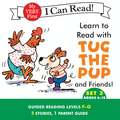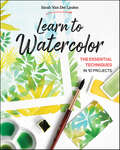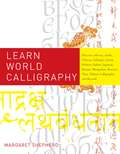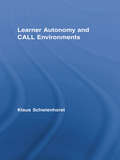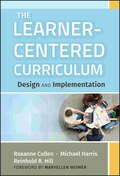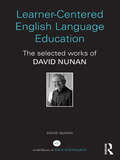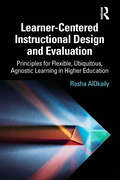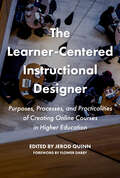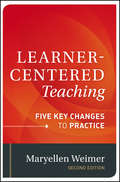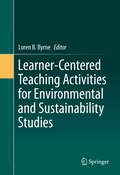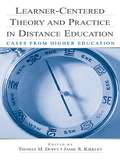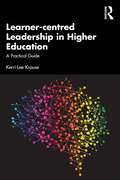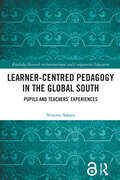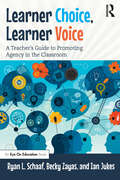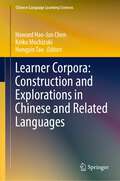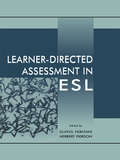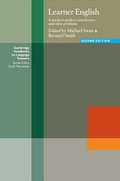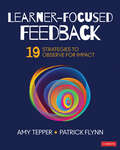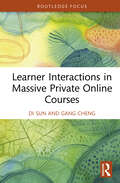- Table View
- List View
Learn to Read with Tug the Pup and Friends! Set 3: Books 6-10 (My Very First I Can Read)
by Dr. Julie WoodBuild your child's beginning reading success with this set of 5 simple and fun storybooks plus a separate parent guide!Written by educator and reading specialist Dr. Julie M. Wood, with lively illustrations by Sebastien Braun, this set of books stars Tug the Pup and an endearing group of characters who will lead beginners through the proven steps for successful reading.The Learn to Read with Tug the Pup books features sight word vocabulary, simple text, strong picture support, and character and plot development. The parent guide lists ideas for building early literacy skills through shared reading, games, and art activities. The 5 stories in this set are Guided Reading Levels F-G, which means the vocabulary, sentence structure, and plots are still simple, but richer than sets one and two.Enter into the world of reading with My Very First I Can Read! This comprehensive emergent reading program addresses all the components of reading mastery based on the latest early literacy research.
Learn to Teach
by Catherine ScottLearn to Teach explores the most up-to-date findings on how children learn, to help teachers create effective learning environments and plan for teaching. Drawing on a neo-Vygotskian approach to learning, it covers the purpose of education; socio-cultural approaches to human cognition; attention and intelligence as cognitive tools; and the role of mindsets, memory and language in learning. It promotes the idea that the mind is a cultural product and that education is best understood as fostering the development of valued cognitive tools appropriate for the 21st century. To provide readers with a holistic understanding of learning, the book explores the significant contributions to the study of learning and teaching from psychologists, sociologists and cultural theorists. Readers are encouraged to critically engage with - and challenge - some of the prevailing learning theories in order to better understand their students. Each chapter features classroom observation exercises, discussion questions and links to further reading.
Learn to Think: Basic Exercises in the Core Thinking Skills for Ages 6-11
by John LangrehrClassroom questions have traditionally focussed on testing the recall, understanding and application of content and methods. Research suggests that pupils require activities that encourage them to think flexibly about possibilities and to make independent judgements about information. Learn to Think takes a cross-curriculum approach and offers a wide range of exercises in all significant thinking skills areas: Organisational Analytical Evaluative Creative Predicting, categorisation, ordering, generalising, problem solving, summarising, analysis, making distinctions, decision making, cause and evidence are among the skills developed. This book introduces the basic core thinking processes used to connect and make sense of information through a range of skill based sections which provide the basis of a thinking skills programme for pupils. It is complete with introductory notes and examples, pupil work sheets, suggested answers and further useful questions. The resources are fully photocopiable and are suitable for 6 -11 year olds.
Learn to Watercolor: The Essential Techniques in 10 Projects
by Sarah Van Der LindenLearn to watercolor paint in 10 easy steps! Get inspired with gentle and serene watercolor painting as your next calming hobby. Learn the foundational skills of watercolor painting with various techniques that will leave you feeling confident in your skills. The watercolors explained in this book achieve two essential objectives: to immediately enjoy painting and acquiring a solid foundation. Master the basics through 10 gorgeous watercolor projects. With each project, you will learn one to three new techniques. Your confidence and inspiration will grow with each stroke of the brush! Learn the foundational skills of watercolor painting while completing 10 easy display-worthy projects Master these basic techniques: painting a perfect gradient, controlling the fusion of colors, playing with the wetness of the paper, creating various textures, and more Paint plants and flowers with watercolors using this easy step-by-step visual guide
Learn World Calligraphy: Discover African, Arabic, Chinese, Ethiopic, Greek, Hebrew, Indian, Japanese, Korean, Mongolian, Russian, Thai, Tibetan Calligraphy, and Beyond
by Margaret ShepherdLearn World Calligraphy has something for everyone. Whether you want scholarly insight, artistic inspiration, classroom projects, or a theme for your next party, this comprehensive, unparalleled full-color book will guide you on a virtual trip around the globe. Covering nearly all of the world's writing systems--from African to Arabic, Chinese to Greek, Hebrew to Russian, and beyond--Learn World Calligraphy offers a unique glimpse of scripts worldwide and the calligraphers who write them.Lushly illustrated with gorgeous examples of both historical and modern calligraphic designs, this book is filled with practical instruction for how key aspects of each exotic script can be applied to the English alphabet, generating calligraphic hybrids with a distinctly foreign flair. Like a new cuisine that you can't wait to cook at home, the scripts you meet in this book are sure to infuse your own calligraphy with the flavor of abroad. Bon voyage!
Learner Autonomy and CALL Environments (Routledge Studies in Computer Assisted Language Learning #Vol. 3)
by Klaus SchwienhorstThis volume brings together two prominent strands in second language acquisition theory and research: the concept of learner autonomy and computer-assisted language learning (CALL). Learner autonomy supports learners in becoming more reflective and communicative and in experimenting with language and language learning. CALL environments offer more and qualitatively different opportunities for learner autonomy than the traditional language classroom. This book offers researchers a starting point into researching learner autonomy in CALL contexts and offers teachers practical advice on chances and pitfalls in realizing learner autonomy goals in the CALL-supported classroom.
The Learner-Centered Curriculum
by Michael Harris Maryellen Weimer Roxanne Cullen Reinhold R. HillMost of the scholarship on learner-centeredness is focused on individual classroom pedagogy, but this book takes learner-centeredness beyond the classroom and asks academic leaders to consider the broader implications of making their institutions fully learner-centered. Systemic change is needed, and curriculum is at the heart of what higher education does. To truly effect change, the curriculum needs to be examined and aligned with learner-centered practices. In this book the authors offer both design specifications for a learner-centered approach to curriculum as well as practical recommendations for implementation and assessment. The book covers the need for redesigning curriculum, curriculum design in the instructional paradigm, learner-centered design in practice, implementation, program assessment (including a helpful rubric for this), innovating through technology, and learning spaces that support learner-centered curricula.
Learner-Centered English Language Education: The Selected Works of David Nunan
by David NunanThis carefully crafted collection provides a snapshot of the evolution of David Nunan‘s theoretical and empirical contributions to the field of second language education over the last 40 years. The volume focuses on the development of his work on second language curricula, and in particular, the work for which he is best known: learner-centered education and task-based learning and teaching. David Nunan has been a language teacher, researcher and consultant for 40 years. He has lived and worked in many countries, principally in the Asia-Pacific region, but also in the Americas, Europe and the Middle-East. In addition to his research and scholarly work, he is the author of several major textbook series for the teaching and learning of English as a foreign Language. These texts are based on his task-based language teaching approach, and are widely used in schools, school systems and universities around the world.
Learner-Centered Instructional Design and Evaluation: Principles for Flexible, Ubiquitous, Agnostic Learning in Higher Education
by Rasha AlOkailyLearner-Centered Instructional Design and Evaluation offers a forward-thinking, evidence-based vision of technology-enhanced higher education that taps into today’s digital access opportunities for more dynamic, agnostic, and inclusive learning experiences. The recent ubiquity of digital devices has fostered a new generation of learners who are technologically adept, engage in rapid social co-construction of knowledge, and expect increased choice and personalisation of educational content and environment. Colleges and universities, however, continue to apply their technology tools into outdated, passive pedagogies. Based on theory and empirical research, this book’s innovative framework guides scholars and practitioners toward instructional design and evaluation approaches that leverage the anytime-anywhere potential of wireless networked devices to foster flexible learning experiences and device-neutral assignments. Each chapter is rich with designs, deliveries, and evaluations of lesson plans, projects, and other real-world course works exemplifying the procedures and principles that will rejuvenate learning amid the globalisation, commodification, and massification of higher education.
The Learner-Centered Instructional Designer: Purposes, Processes, and Practicalities of Creating Online Courses in Higher Education
by Jerod Quinn Flower Darby“What does a new instructional designer need to know to find her or his feet when working with faculty to create online classes?” This is a practical handbook for established and aspiring instructional designers in higher education, readers who may also be identified by such professional titles as educational developer, instructional technologist, or online learning specialist. Jerod Quinn, together with a team of experienced instructional designers who have worked extensively with a wide range of faculty on a multiplicity of online courses across all types of institutions, offer key guiding principles, insights and advice on how to develop productive and collegial partnerships with faculty to deliver courses that engage students and promote enduring learning.Designing and developing online classes for higher education takes a combination of pedagogical knowledge, the ability to build trust with faculty, familiarity with frameworks on how people learn, understanding of accessibility and inclusion, and technical skills to leverage a learning management system into an educational experience. Coming from diverse backgrounds, few instructional designers enter academia well versed in all of these aspects of creating online classes. This book provides the foundation on which instructional designers can build their careers. The guiding principle that animates this book is that the student experience and successful learning outcomes are paramount, and governs discussion of course design, pedagogy, the use of multimedia and technological advances, as well as the use of different forms of interactive exercises and group assignments. The succinct, informally written chapters offer ideas and means to apply theory to the daily work of instructional design and cover the four key components that drive this work in higher education: ·Defining the scope and main design approaches of our work·Building trust with the faculty we work with·Applying frameworks of how people learn·Mastering common online instructional practices.
Learner-Centered Leadership: Research, Policy, and Practice (Topics In Educational Leadership Ser.)
by Arnold B. Danzig, Kathryn M. Borman, Bruce A. Jones and William F. WrightMany new approaches to school improvement are being proposed in the current climate of assessment and school accountability. This book explores one of these approaches, a new model of leadership training known as Learner-Centered Leadership (LCL). It is built around the fundamental idea that learning and learning communities are natural processes that, when properly harnessed, can lead to the highest levels of professional engagement and problem solving. Key features of this exciting new approach to school leadership include the following: Broad-based and Generative—The book’s narratives vividly illustrate the extraordinary ability of LCL to generate new approaches to leadership development. For example, encouraging and assisting school leaders to reflect on their own leadership attributes relative to the implementation of the school mission to ensure high teacher efficacy and student learning. In this respect the volume contributes significantly to the field of school leadership and professional development by extending above and beyond a narrow focus on instructional leadership. Practice Oriented—By creating communities that encourage conversation and analysis the new data-driven models of school improvement are more likely to be successfully implemented. Without analytical discourse, the process of interpreting school data and transforming it into practice would be largely lost. Conceptually Appropriate—The realization that everyone within a school (students, teachers, administrators) belongs to the same learning community minimizes status differences and encourages teamwork. The LCL administrator is much less likely to be authoritarian and power-oriented and much more likely to be transformative and student outcome focused. This book is appropriate for master’s level courses and certification seminars, and for inservice workshops dealing with school leadership.
Learner-Centered Teaching: Putting the Research on Learning into Practice
by Terry DoyleThis book presents the research-based case that Learner Centered Teaching (LCT) offers the best means to optimize student learning in college, and offers examples and ideas for putting it into practice, as well the underlying rationale. It also starts from the premise that many faculty are much closer to being learner centered teachers than they think, but don’t have the full conceptual understanding of the process to achieve its full impact. There is sometimes a gap between what we would like to achieve in our teaching and the knowledge and strategies needed to make it happen.LCT keeps all of the good features of a teacher-centered approach and applies them in ways that are in better harmony with how our brains learn. It, for instance, embraces the teacher as expert as well as the appropriate use of lecture, while also offering new, effective ways to replace practices that don’t optimizing student learning. Neuroscience, biology and cognitive science research have made it clear that it is the one who does the work who does the learning. Many faculty do too much of the work for their students, which results in diminished student learning. To enable faculty to navigate this shift, Terry Doyle presents an LCT-based approach to course design that draws on current brain research on cognition and learning; on addressing the affective concerns of students; on proven approaches to improve student’s comprehension and recall; on transitioning from “teller of knowledge” to a “facilitator of learning”; on the design of authentic assessment strategies – such as engaging students in learning experiences that model the real world work they will be asked to do when they graduate; and on successful communication techniques.The presentation is informed by the questions and concerns raised by faculty from over sixty colleges with whom Terry Doyle has worked; and on the response from an equal number of regional, national and international conferences at which he has presented on topics related to LCT.
Learner-Centered Teaching
by Maryellen WeimerIn this new edition of the classic work, one of the nation's most highly regarded authorities on effective college teaching offers a comprehensive introduction to the topic of learner-centered teaching in the college and university classroom, including the most up-to-date examples of practice in action from a variety of disciplines, an entirely new chapter on the research support for learner-centered approaches, and a more in-depth discussion of how students' developmental issues impact the effectiveness of learner-centered teaching. Learner-Centered Teaching shows how to tie teaching and curriculum to the process and objectives of learning rather than to the content delivery alone.
Learner-Centered Teaching Activities for Environmental and Sustainability Studies
by Loren B. ByrneLearner-centered teaching is apedagogical approach that emphasizes the roles of students as participants inand drivers of their own learning. Learner-centered teaching activities gobeyond traditional lecturing by helping students construct their ownunderstanding of information, develop skills via hands-on engagement, andencourage personal reflection through metacognitive tasks. In addition,learner-centered classroom approaches may challenge students' preconceivednotions and expand their thinking by confronting them with thought-provokingstatements, tasks or scenarios that cause them to pay closer attention andcognitively "see" a topic from new perspectives. Many types of pedagogy fallunder the umbrella of learner-centered teaching including laboratory work,group discussions, service and project-based learning, and student-ledresearch, among others. Unfortunately, it is often not possible to use some ofthese valuable methods in all course situations given constraints of money,space, instructor expertise, class-meeting and instructor preparation time, andthe availability of prepared lesson plans and material. Thus, a major challengefor many instructors is how to integrate learner-centered activities widelyinto their courses. The broad goal of this volume is to helpadvance environmental education practices that help increase students'environmental literacy. Having a diverse collection of learner-centeredteaching activities is especially useful for helping students develop theirenvironmental literacy because such approaches can help them connect morepersonally with the material thus increasing the chances for altering theaffective and behavioral dimensions of their environmental literacy. Thisvolume differentiates itself from others by providing a unique and diversecollection of classroom activities that can help students develop theirknowledge, skills and personal views about many contemporary environmental andsustainability issues.
Learner-Centered Theory and Practice in Distance Education: Cases From Higher Education
by Thomas M. Duffy Jamie R. KirkleyLearner-Centered Theory and Practice in Distance Education: Cases From Higher Education brings the voice of the learning sciences to the study and design of distance learning. The contributors examine critical issues in the design of theoretically and pedagogically based distance education programs. Eight distance education programs are described in enough detail to allow readers with different interests to understand the pedagogical approaches and the implications of implementing those approaches. Issues of theory, pedagogy, design, assessment, communities of practice, collaboration, and faculty development are discussed.Each section of the book includes: *a primary chapter written by an author or authors involved with a distance education program that reflects learner-centered principles;*a formal reaction to the chapter by a specialist from the learning sciences, educational evaluation and policy, administration, or the corporate sector with expertise in issues of distance learning; and *an edited transcript of the authors' discussion of the primary chapter held at a symposium at the Asilomar Conference Center. A final "summing up" section offers two perspectives--from leading scholars outside the fields of instructional design, evaluation, and the learning sciences--on the approaches and thinking reflected in the rest of the book. This book is essential for researchers, as well as all those engaged in delivering, supporting, or administrating distance education programs at the post-secondary level. The descriptions, strategies, and principles will inform the design of continuing education, as well as degree-based education and corporate education and training, and distance education programs for adults.
Learner-centred Education in International Perspective: Whose pedagogy for whose development? (Education, Poverty and International Development)
by Michele SchweisfurthIs learner-centred education appropriate for all societies and classrooms? Learner-centred education (LCE) is a travelling policy, widely promoted by international agencies and national governments. Arguments in favour of this pedagogical tradition refer to theories and evidence from cognitive psychology, claiming that all learners can benefit equally from its judicious use. Beyond the benefits to the individual however, lie a set of assumptions about learner-centred education as a foundation for the building of democratic citizens and societies, suitable for economies of the future. These promises have been questioned by critics who doubt that it is appropriate in all cultural and resource contexts, and there is considerable evidence in the global South of perennial problems of implementation. In the light of these debates, is LCE still a good development ‘bet’? This book provides an authoritative and balanced investigation of these issues, exploring the contextual factors from global movements to local resourcing realities which have fuelled it as a discourse and affected its practice. In the light of the theoretical underpinnings and research evidence, the book addresses pressing questions: to what extent is learner-centred education a sound choice for policy and practice in developing countries? And if it is a sound choice, under which conditions is it a viable one? The book is divided into three key parts: - Learner-centred Education as a Global Phenomenon - Learner-centred Education in Lower and Middle-income Countries - Lessons and Resolutions This book provides a much-needed fresh analysis of the concept and practice of LCE. It will be valuable reading for academics and post-graduates with a focus on comparative and international education, along with policy-makers in developing countries and development agencies.
Learner-centred Leadership in Higher Education: A Practical Guide
by Kerri-Lee KrauseThis is the go-to guide for higher education leaders of learning, teaching and the learner experience. It offers research-enriched, practical insights and case studies, together with a must-have toolkit of strategies for future-focused higher education leaders. Kerri-Lee Krause combines her extensive track record as a senior university executive, award-winning teacher and higher education researcher. Inspired by the disruptive educational opportunities arising from the global COVID-19 pandemic, Krause takes academic and professional staff leaders on a journey through the core capabilities required of successful leaders in a rapidly changing higher education landscape. Key topics include: learner-centred strategy co-design; collaborative strategy implementation with learners at the heart; leading curriculum innovation and renewal; partnering with learners for engagement and success; collegial academic and professional staff capability-building and leadership development; coming to terms with educational policy development and quality work; shaping learner-centred cultures; and leading with integrity in higher education. As universities and higher education providers look for ways to rebuild in the wake of a global pandemic, capable, courageous, learner-centred leadership matters more than ever. This readable, intellectually rich and practical book is for current and aspiring higher education leaders who have a passion for effective leadership with learners at the heart.
Learner-Centred Pedagogy in the Global South: Pupils and Teachers’ Experiences (Routledge Research in International and Comparative Education)
by Nozomi SakataLearner-Centred Pedagogy in the Global South: Pupils and Teachers’ Experiences shines light on learner-centred pedagogy (LCP), which has gained popularity within global and national governments, albeit resulting in puzzling and inconsequential appropriation. Nozomi Sakata draws on award-winning research on learner centred pedagogy conducted in Tanzania that looks to shift the focus from teachers and teaching to students and learning. The recent spread of LCP through global policy discourse meets Tanzania’s historical and contemporary (in)compatibility in local schools. The book explores how pupils’ perceived classroom experiences are formed through pedagogical elements beyond the classroom. It also enquires into how observable LCP activities and/or pupils’ perceptions of classroom practices relate to their academic performance and learning attitudes. The book highlights the multidimensionality of pedagogy and the need to consider multiple viewpoints from both teachers and pupils and to consider the historical and socio-cultural contexts in any pedagogical research. This book will be of value to researchers and students interested in pedagogy, policy transfer and education reforms in the global South. The Chapters 5, 6 and 8 of this book are available for free in PDF format as Open Access from the individual product page at www.routledge.com. It has been made available under a Creative Commons Attribution-Non Commercial-No Derivatives 4.0 license.
Learner Choice, Learner Voice: A Teacher’s Guide to Promoting Agency in the Classroom
by Ryan L Schaaf Becky Zayas Ian JukesLearner Choice, Learner Voice offers fresh, forward-thinking supports for teachers creating an empowered, student-centered classroom. Learner agency is a major topic in today’s schools, but what does it mean in practice, and how do these practices give students skills and opportunities they will need to thrive as citizens, parents, and workers in our ever-shifting climate? Showcasing authentic activities and classrooms, this book is full of diverse instructional experiences that will motivate your students to take an agile, adaptable role in their own learning. This wealth of pedagogical ideas – from specific to open-ended, low-tech to digital, self-expressive to collaborative, creative to critical – will help you discover the transformative effects of providing students with ownership, agency, and choice in their learning journeys.
Learner Corpora: Construction and Explorations in Chinese and Related Languages (Chinese Language Learning Sciences)
by Howard Hao-Jan Chen Keiko Mochizuki Hongyin TaoThis edited book reflects the state of the art in learner corpus and related approaches to Chinese as a second language (CSL). CSL as a field has flourished in the past few decades due to the increasingly important role of the Chinese language at the world stage, yet studies of Chinese as a second language based on learner corpora have been less well developed due to the limited availability of data and lack of theoretical insights. This book represents the latest research in this area by 1) assembling a large group of active researchers from multiple international research communities (USA, China, Hong Kong, Macau, Japan, Taiwan, and France); 2) discussing the latest resources and technologies in Chinese and other Asian languages learner corpora and corpus building; 3) basing Chinese as a second language studies on data from learners of Chinese with a wide range of first language backgrounds (English, Japanese, Korean, French, among others); and 4) integrating corpus methods with a wide range of related methods in allied fields—language acquisition, usage-based linguistics, psycholinguistics, and neurolinguistics. This comprehensive collection is indispensable for anyone who is interested in corpus approaches to CSL and Chinese applied language studies in general.
Learner-directed Assessment in Esl
by Glayol V. Ekbatani Herbert D. PiersonThis text integrates the theory and practice of learner-based assessment. Written in response to two recent movements in language teaching--learner-centered teaching and a renewed interest in authenticity in language testing--it examines the relationship between the language learner and language assessment processes, and promotes approaches to assessment that involve the learner in the testing process. Particular attention is given to issues of reliability and validity. Grounded in current pedagogical applications of authentic assessment measures, this volume is intended for and eminently accessible to classroom teachers and program directors looking for ways to include their students in the evaluation process, graduate students, and professional language testers seeking authenticity in assessment and desiring to create more interactive evaluation tools.
Learner English: A Teacher's Guide to Interference and Other Problems
by Michael Swan Bernard SmithThis updated edition is a practical reference guide which compares the relevant features of a student's own language with English, helping teachers to predict and understand the problems their students have. Learner English has chapters focusing on major problems of pronunciation, grammar, vocabulary and other errors as well as new chapters covering Korean, Malay/Indonesian and Polish language backgrounds.
Learner-Focused Feedback: 19 Strategies to Observe for Impact
by Amy Tepper Patrick W. FlynnNew strategies for feedback that supports a culture of learning. The skill set required for observing why students are learning and how teachers influence that is a difficult one to master—yet it&’s essential for driving school change and growth. With this companion to the best-selling Feedback to Feed Forward, observers in any role—leaders, coaches, and teachers themselves—will improve their ability to identify desired outcomes, recognize learning in action, collect relevant evidence, and develop supportive, and effective feedback. Features include: · Nineteen strategies for learner-centered, learning-focused observations · Authentic classroom examples · Observer think-alouds · Stories from the field with &“Give-It-a-Try&” tools and &“Stop and Think&” questions Follow-up steps specific to each role
Learner-Focused Feedback: 19 Strategies to Observe for Impact
by Amy Tepper Patrick W. FlynnNew strategies for feedback that supports a culture of learning. The skill set required for observing why students are learning and how teachers influence that is a difficult one to master—yet it&’s essential for driving school change and growth. With this companion to the best-selling Feedback to Feed Forward, observers in any role—leaders, coaches, and teachers themselves—will improve their ability to identify desired outcomes, recognize learning in action, collect relevant evidence, and develop supportive, and effective feedback. Features include: · Nineteen strategies for learner-centered, learning-focused observations · Authentic classroom examples · Observer think-alouds · Stories from the field with &“Give-It-a-Try&” tools and &“Stop and Think&” questions Follow-up steps specific to each role
Learner Interactions in Massive Private Online Courses
by Di Sun Gang ChengBy employing learning analytics methodology and big data in Learning Management Systems (LMSs), this volume conducts data-driven research to identify and compare learner interaction patterns in Massive Private Online Courses (MPOCs). The uncertainties about the temporal and sequential patterns of online interaction, and the lack of specific knowledge and methods to investigate details of LMSs' dynamic interaction traces have affected the improvement of online learning effectiveness. While most research focuses on Massive Open Online Courses (MOOCs), little is investigating the learners’ interaction behaviors in MPOCs. This book attempts to fill in the gaps by including research in the past decades, big data in education presenting micro-level interaction traces, analytics-based learner interaction in massive private open courses, and a case study. Aiming to bring greater efficiency and deeper engagement to individual learners, instructors, and administrators, the title provides a reference to those who need to evaluate their learning and teaching strategies in online learning. It will be particularly useful to students and researchers in the field of Education.
